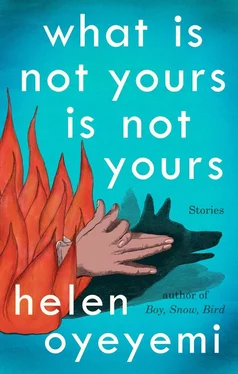—
AS A FORM of escape from involuntary giving, the girl tried to identify those who were in the most pain and spent evenings at her local hospital just sitting with people, holding hands for as long as she could. She tried to do the same on the psychiatric ward but the security was tighter there. When she came home she stayed near her mother, whose addiction to painkillers had already caused her to injure herself for the sake of high-strength prescriptions. The woman’s nerves tormented her so that only medication prevented her howling becoming a source of public or even domestic disturbance. From the little that the woman had been able to explain to her, the girl knew that her mother thought strange thoughts she could never tell anyone. Graphic structures appeared on the insides of her eyelids, a minute exhibition of X-ray photographs. There was affection between mother and daughter, but they’d given up trying to express it; rather than force a display they simply asked for each other’s good faith. And no matter how many times the girl offered her hand, her mother refused it. It was the usual struggle between one who loves by accepting burdens and one who loves by refusing to be one. Really the mother’s pursuit of pills wasn’t motivated by the necessity of avoiding pain, but a determination to avoid any feeling at all. That’s why the pills were better than holding the child’s hand.
—
THE GIRL’S father was a puppeteer, and there came a day when he was called to perform in Prague; an honor it would’ve been difficult to disregard. He’d never dreamed of being noticed by the puppeteers at work in that city, let alone considered a colleague. The professor’s wife read this as a sign that she must either break or bend. She told her husband it would be good for him to take their daughter traveling, and checked into a clinic as an answer to her family’s anxieties about her being alone. So the girl found herself living in Prague. Rowan himself has no particular view of Prague, but I know it a little, and it was fitting that the likes of Myrna Semyonova was let loose in a city whose streets combined sepia-filtered rainbows and shapes of nightmarish precision. If I truly remember the street Rowan mentioned, then Myrna and her father lived in a building that looked like an avenue of concrete gallows welded together with steel. Apart from enforcing her school attendance, her father left her to her own devices; she was free to watch his rehearsals and performances or to improve her graffiti skills, aggravate swans on the banks of the Vltava, or anything else that seemed like a good idea. Myrna loved to watch her father with his puppets — he showed her the influence it was possible to have from a slight distance — so she spent a lot of time at the theater that became his second home. But she also began a correspondence with her mother that pleased them and led to the discovery that both strudel and currant buns remain on the edible side after delivery by forty-eight-hour courier service. From time to time they briefly discussed recovery, and Myrna began to hear a change in the language her mother used to describe her pain — they were words that spoke more of bending than breaking.
—
MYRNA HAD ASSUMED command over two boys who lived in the flat above her own: Jindrich and Kirill, the Topol brothers. Myrna was both boys’ grand passion… they called her “London” and longed for a chance to rescue her from some danger or other. Sometimes one brother would menace her so that the other could defend her, even though she’d emphasized from the beginning that all she required of them was that they both die for her if and when such endeavor became necessary. The Topols were in the process of teaching Myrna some Czech, so her instructions were mostly mimed, but the brothers understood her at once. Death frequently crossed their minds, and why shouldn’t it, when Myrna had become a participant in their Sunday afternoon wrestling matches in Olšany cemetery? Kirill was ferocious and Jindrich was fleet of foot, but Myrna was nimbler still, and her brutality was fed by her desire not to cheat. Instead of laying hands on her opponent she wove figures of eight until he was exhausted and some obliging tree branch gave her the height to safely grab Jindrich or Kirill with both feet and slam him to the ground, with the additional offense of forcing him to break her own fall.
—
WITH ITS TENS OF THOUSANDS of graves, Prague’s Olšany cemetery is a large village, a small town, in itself. I, Gepetta, have been there, and I know that something travels in that place, something passes among the trees. I cannot say what this traveler is, since we’ve never crossed paths, but what I’ve been able to see for myself is that in some of Olšany clearings leaves lock together and form shadowy bridges from branch to branch, and the barks of these bridged trees peel back to show a color that glistens with rawness and decay, sap and old bone. The Topols and Myrna followed this trail, switching wrestling arenas for about a month, scrambling through swathes of undergrowth, administering the occasional surprise fly-kick (no matter how many times it’s happened before, it’s always startling to be assaulted by a bush) before they discovered the little wooden devil. The wooden devil had been aware of them for weeks. She was carved of rowan wood, and she retained the opinions of trees: one of them being that it was best not to have anything to do with human folk. “Firstly, they cut us down,” Rowan said. “Secondly they’re all insane, though I suppose they can’t help that, being rooted in water instead of earth.”
—
THE WOODEN devil got a good laugh out of the ones who passed by, though. They were so funny she couldn’t even feel sorry for them. They tried so hard to keep track of time. Whenever they were together they couldn’t let sixty of their minutes pass without asking each other what time it was; as if time was a volatile currency that they either possessed or did not possess, when in fact time was more of a fog that rose inexorably over all their words and deeds so that they were either forgotten or misremembered. The wooden devil’s official duty was to guard the grave of an alchemist named Rowan Wayland. The grave was empty; in fact it was one of seven scattered across the continent, and the other six were empty too. As an alchemist, Wayland had liked the idea of implying that he’d excelled at his profession — this could only work if he left absolutely no evidence of having died. His plan had worked. Six centuries had passed and the residents of the streets surrounding the cemetery still didn’t feel they could rule out the possibility of his being around somewhere. Every fourteenth of July without fail the town council received a bag of antique gold from an anonymous benefactor; symbolic payment for Wayland’s burial plot. It was actually somewhat unlikely that this payment came from Wayland himself, since the main reason King Rudolf had ordered the alchemist’s execution was his failure to produce gold from base metal as promised. Wayland had good friends. They arranged for a wooden puppet to be buried in place of his body. The man himself had fled the Czech lands and lived to advance his career in other royal courts.
The wooden devil had been through a lot since she’d been discovered to be the grave’s sole inhabitant — she’d been waxed and lacquered and pegged to the earth, frozen, drenched, and dried out again. She’d even seen the traveler in the trees: “Spinning, as a wheel does.” The life in the wooden devil was slight and vague, only a little more than that possessed by inanimate puppets, but it was maintained by the fact that the first impression she gave was one of humanity. Graveyard visitors approaching the wooden devil from behind tended to mistake her for someone about the same age as Myrna Semyonova was at that time, and would confidently strike up conversation, though they were either sheepish or oddly repulsed when they discovered their mistake. At any rate this persistence of address cultivated a silent response. The wooden devil had a good vantage point, and served as secret audience to a few Topol-Semyonova wrestling matches. The devil was slightly worried that Myrna and the boys would make a nuisance of themselves once they found her. But there was one tree that the wooden devil thought of as her mother, because this tree had murmured soothingly to her when she’d still been coming up as sapling. That tree watched over her still, and murmured what the elder trees at Olšany always murmured:
Читать дальше












